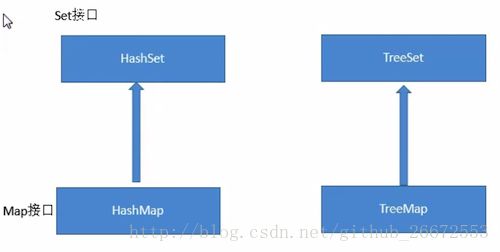TreeMap、二叉树
前面我们学习了
Collection下面有:
1、List(ArrayList、LinkedList、Vector),重点我们理解了线程安全和不安全
2、Set下面的HashSet
Map下面的HashMap。
其中HashSet是基于HashMap实现的(就是HashMap的key,不重复)。
TreeMap
Map users = new TreeMap();
users.put("jack",19);
users.put("lily",20);
users.put("susan",22);
users.put("robin",27);
// 对users遍历
for (Map.Entry entry: users.entrySet()){
System.out.println(entry.getKey()+":"+entry.getValue());
} 打印结果:
jack:19
lily:20
robin:27
susan:22可以看出TreeMap的对象遍历的时候默认是针对其key排序的。
如果我们要自定义排序方式,比如上面的排序 我们要倒序。
Map<String,Integer> users = new TreeMap<String,Integer>(new Comparator<String>() {
@Override
public int compare(String o1, String o2) {
return o2.compareTo(o1);
}
});
users.put("jack",19);
users.put("lily",20);
users.put("susan",22);
users.put("robin",27);
// 对users遍历
for (Map.Entry<String,Integer> entry: users.entrySet()){
System.out.println(entry.getKey()+":"+entry.getValue());
}我们注意到new TreeMap里我们传入了Comparator对象,内部把o2和o1的ASCII码值进行比较。
现在输出结果:
susan:22
robin:27
lily:20
jack:19按照字符串长度以及ASCII码进行比较:
Map<String,Integer> users = new TreeMap<String,Integer>(new Comparator<String>() {
@Override
public int compare(String o1, String o2) {
return (o1.length()-o2.length()) + o1.compareTo(o2);
}
});最后结果如下:
jack:19
lily:20
robin:27
susan:22TreeMap是一个树结构
前面我们接触的ArrayList它是一个数组结构,LinkedList,它是一个链表结构。

比较简单的『树结构』就是二叉树,又称二叉查找树/二叉搜索树。
1、有个树根:Root
2、作用拥有2个子树(子节点)
3、左边子节点的值比自己小,右边子节点的只比自己大
写代码
1、写一个二叉树类BTree.java:
// 二叉树类
public class BTree {
public Node root = null; //二叉数的根节点
// 插入数据的方法
public void put(int data){
if (this.root == null){
this.root = new Node(data);
}else {
this.root = this.addNode(root,data);
}
}
// 添加节点
private Node addNode(Node node,int data){
if (node == null){
return new Node(data);
}
if (data < node.selfData){
node.leftNode = addNode(node.leftNode,data);
}else if (data > node.selfData){
node.rightNode = addNode(node.rightNode,data);
}
return node;
}
public void List(){
List(root);
}
// 递归遍历所有节点
public void List(Node n){
if (n != null){
List(n.leftNode); //递归
System.out.println(n.selfData);
List(n.rightNode);
}
}
// 节点类
class Node{
private Node leftNode = null; //左节点
private Node rightNode = null; //右节点
private int selfData; //节点自身的数据
// 构造函数
public Node(int selfData) {
this.selfData = selfData;
}
}
}2、调用这个类,往二叉树对象里插入数据,最后遍历
// 实例化二叉树
BTree bTree = new BTree();
// 插入数据
bTree.put(5); //这就是树根
bTree.put(3);
bTree.put(7);
bTree.put(2);
bTree.put(9);
bTree.put(8);
bTree.put(1);
bTree.put(6);
// 显示二叉树对象中的所有数据
bTree.List();最后遍历打印结果如下:
1
2
3
5
6
7
8
9如果要倒序,在BTree类的List()方法中就先打印右节点,后打印左节点:
// 递归遍历所有节点
public void List(Node n){
if (n != null){
List(n.rightNode); //递归
System.out.println(n.selfData);
List(n.leftNode);
}
}